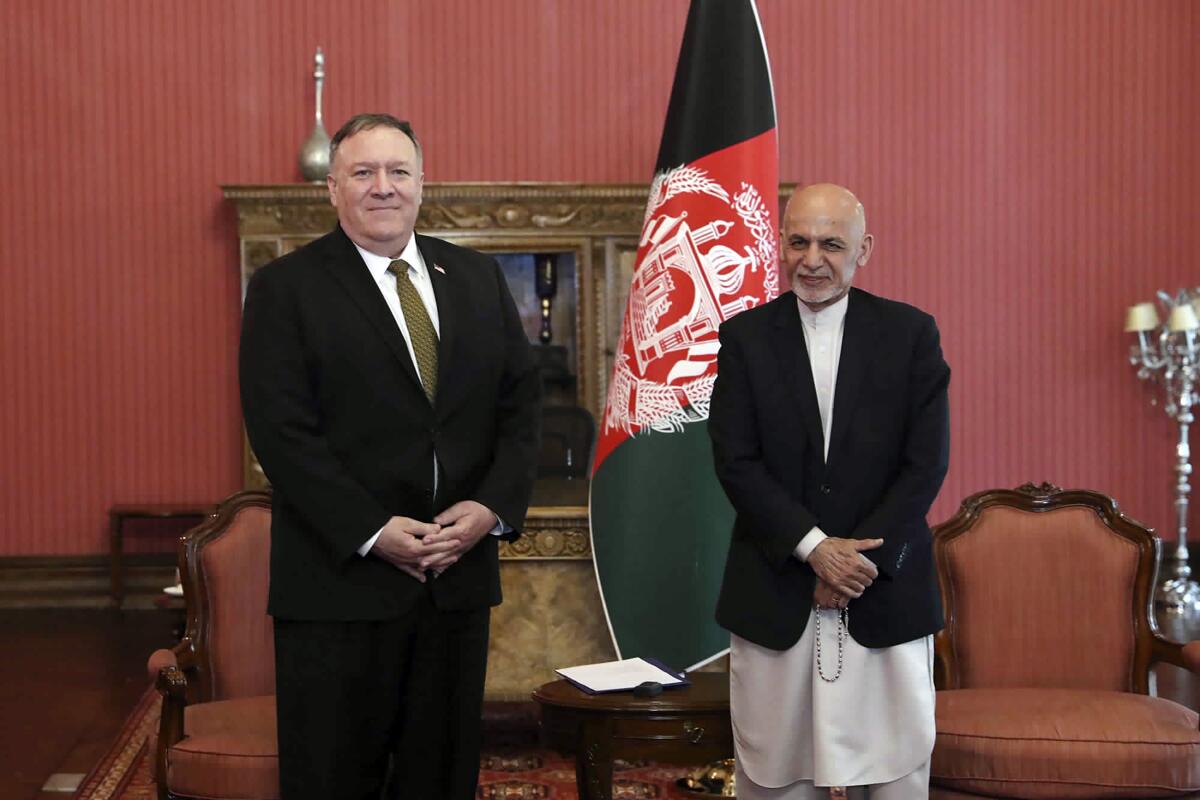U.S. threatens to slash $2 billion to Afghanistan as peace talks teeter

- Share via
WASHINGTON — Facing collapse of Afghan peace talks before they even start, the Trump administration has threatened to withhold up to $2 billion in aid unless President Ashraf Ghani and his main rival put aside their political differences and open negotiations with the Taliban.
Rebuking the Afghan officials as “irresponsible” and dishonorable, Secretary of State Michael R. Pompeo publicly warned that U.S. aid to the central government could be slashed after his emergency visit to Kabul on Monday failed to resolve the dispute between Ghani and his former coalition partner, Abdullah Abdullah.
“Because this leadership failure poses a direct threat to U.S. national interests, effective immediately, the U.S. government will initiate a review of the scope of our cooperation with Afghanistan,” Pompeo said.
The threat was the sharpest sign yet that the Trump administration is distancing itself from its Afghan ally and moving closer to the Taliban. The longtime U.S. adversary has in effect become a wary partner as President Trump seeks to withdraw thousands of American troops before the November election and end America’s longest war.
U.S. and Taliban forces have largely halted attacks on each other, a key commitment in an agreement that the two sides signed last month in Qatar. Nor has the militant group conducted large scale suicide bombings in Kabul and other urban centers, meeting another U.S. demand.
In return, the Pentagon has started withdrawing the first of its 12,000 troops, aiming to be down to 8,600 by midsummer and to be out entirely in 14 months, a central Taliban demand.
The shaky U.S.-Taliban peace has taken hold even though Taliban fighters have stepped up attacks on Afghan troops, causing hundreds of casualties at government checkpoints and remote bases around the country.
On Tuesday, Gen. Austin “Scott” Miller, the top U.S. commander in Afghanistan, said that the U.S. has told Taliban leaders that the group’s attacks are threatening the peace process, and that the U.S. reserved the right to strike back in response to the Taliban offensive.
“I do want to talk about violence. We all know that it’s too high,” Miller said in televised remarks during a meeting in Kabul with Afghan commanders. “We’ve told the Taliban that it’s too high as well, and we tell them that on a daily basis.”
At least 27 Afghan soldiers were killed in a single attack last week when Taliban fighters stormed a military post in the southern province of Zabol. It was one of the biggest attacks since the agreement was signed in Qatar on Feb. 29 in an effort to reduce violence and set the stage for inter-Afghan talks.
The Taliban did not commit to halting attacks on Afghan troops, but it agreed to work toward a cease-fire if talks with Kabul begin. The document includes secret provisions concerning the levels and types of attacks that would prompt U.S. reprisals.
Andrew Watkins, a Kabul-based analyst with the International Crisis Group, said ambiguous language in the document leaves the U.S. “wiggle room” to decide when and if to respond.
The only known U.S. response so far was a March 4 airstrike against Taliban fighters who were assaulting an Afghan government checkpoint — and an admonishment by a U.S. military spokesman in Kabul that the Taliban should “stop needless attacks.”
Instead of daily airstrikes and U.S. special forces raids to assist Afghan troops battling the Taliban, the Pentagon’s chief tactic until recently, the Trump administration has focused on persuading Ghani to reach a deal with the Taliban.
Even as he threatened to cut critical aid to Kabul, Pompeo insisted that the U.S. “is not abandoning our partnership with Afghanistan.”
But Paul D. Miller, a National Security Council official responsible for Afghanistan under Presidents George W. Bush and Obama, likened the situation to the point in the Vietnam War when the Nixon administration negotiated a deal with Hanoi and forced the U.S. ally in Saigon to accept it. Two years later, Hanoi’s forces captured Saigon.
“The fragmentation of the Afghan state becomes a real possibility, as does civil war, a military coup, or a Taliban victory,” Miller said in an interview. “None of those outcomes are consistent with U.S. interests.”
Many Afghan officials see the nascent peace process as a trap to force them into negotiations that, at best, will lead to a U.S. troop pullout and a power-sharing agreement with the Taliban, who ruled with a brutal form of Islamic law in the 1990s.
At worst, they fear, the country will plunge back into bloody civil war.
Ghani has balked so far at a planned prisoner exchange of up to 5,000 Taliban prisoners — a confidence-building measure included in the peace plan. That has delayed indefinitely the planned start of peace talks in Oslo between Kabul officials and Taliban leaders.
Ghani also has not finalized a negotiating team that is supposed to include all political factions as well as women, minorities and human rights activists.
Abdullah and Ghani have jockeyed for advantage, neither one willing to risk losing support by embarking on risky talks with the Taliban. The two former coalition partners announced competing governments last month after both claimed to have won Afghanistan’s disputed presidential election.
“The fear is that unless this crisis gets resolved and resolved soon, that could affect the peace process,” a senior State Department official told reporters traveling with Pompeo. “And our agreement with the [Taliban] could be put at risk.”
The U.S. does have leverage over Ghani.
The Kabul government is heavily dependent on international assistance. U.S. aid was expected to total $4.3 billion this year, all but $500 million of which was earmarked for training and equipping the Afghan army.
If carried out, the $2-billion cut outlined by Pompeo, which he said could be withheld over two years, could severely cripple Afghan government operations, especially its military operations against the Taliban, analysts said.
Afghan and Taliban officials made their first direct contact Sunday, using Skype videoconferencing to discuss procedures for prisoner releases. But they made little apparent progress, other than to agree that the risk of coronavirus infection made transfers more urgent.
In a clear signal to Ghani that U.S. patience is wearing thin, Pompeo — after his unsuccessful mediation between Ghani and Abdullah in Kabul — flew to Qatar for talks with Mullah Abdul Ghani Baradar, the Taliban official who negotiated the agreement with the United States.
Both sides said the meeting went well.
More to Read
Get the L.A. Times Politics newsletter
Deeply reported insights into legislation, politics and policy from Sacramento, Washington and beyond. In your inbox three times per week.
You may occasionally receive promotional content from the Los Angeles Times.











